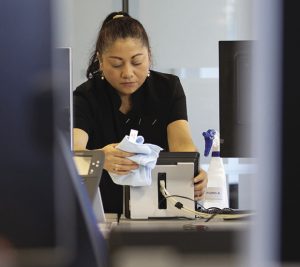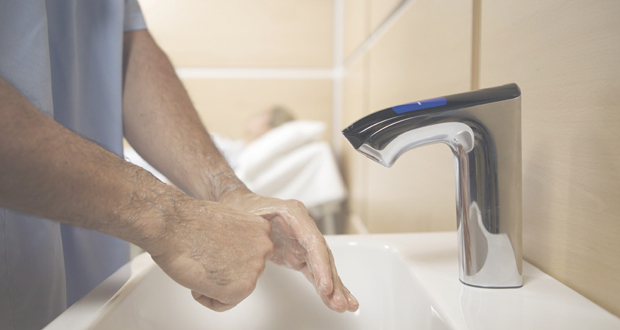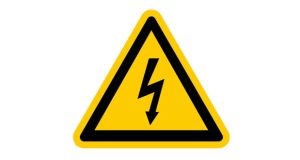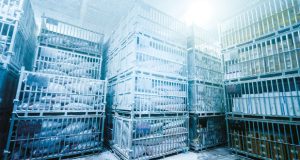As more of us prepare to return to the workplace, cleaning specialists offer advice on the steps FMs should take to help ensure their premises remain clean and infection free
The Government has now confirmed that many businesses – such as non-essential retailers can now reopen and, although those who can work from home can continue to do so, the majority of organisations are preparing workplaces for at least partial reoccupation. For FMs this means ensuring that buildings are made ready to safely reintroduce occupants and once people are back, are kept as sanitary as possible.
Before reopening, commercial buildings will require a deep clean, but what does that mean in practice? According to Dale Jones, Head of Technical Development at Alcumus SafeContractor, under the Workplace (Health, Safety and Welfare) Regulations(1) there is a legal duty to ensure that all premises and workplaces are kept sufficiently clean, but there is no real legal definition of what constitutes a deep clean. However, there is reference within HSE guidance for the need for high standards of cleanliness for controlling exposure to substances hazardous to health.
“The type and level of cleaning required prior to reoccupying your premises will depend on your risk assessment for your particular site and/or the activities undertaken,” explains Jones.
“There are a number of things to consider. For some businesses the workplace may have been closed down for a number of weeks, so you will need to consider whether anyone has periodically gained access to the facility i.e. to undertake maintenance or security related tasks. Are you aware of any of your workforce coming down with COVID-19 and had access to the facility during the lockdown period or simply when was the last time [the building] was thoroughly cleaned?
“Some businesses are seeing it as best practice to deep clean their premises, to ensure everything is as clean and safe as possible prior to bringing back the team. It is also a very visual reminder to the workforce that as a business you are taking safety seriously.”
In terms of the products you should use to carry out a deep clean, Dominic Ponniah, CEO of Cleanology says there are many different systems on the market, but: “We recommend products that contain active biocides specifically designed for the cleansing and disinfecting of hard and soft surfaces, as well as proven for use on skin. It is important to access all hard-to-reach areas, without leaving surfaces wet.
“Our system, for example, uses a mist spray with fogging technology that deals effectively with a range of bacteria, viruses and fungi, including MRSA, E-Coli, HIV-1 and Coronavirus viruses. Companies should be able to provide you with a certificate of completion if you require it for insurance. It may also be prudent to commission deep cleaning of offices, toilets and kitchens, and focus on areas and items such as IT, carpets and upholstery and hard floors.”
CLEANING REGIMES
The way cleaning regimes are organised is one of the most noticeable changes following COVID-19. Says Ponniah: “Prior to the arrival of the virus, increasing numbers of customers were shifting to night-time cleaning; now we are seeing the reverse. Instead of sending 10 cleaners to manage a night-time shift, for example, we have had many requests for a team of three cleaners throughout the day. Employers want to reassure staff that they are taking hygiene seriously, and increased cleaning – and visible evidence of increased cleaning – is the first step.”
He warns that mobilising staff will be a challenge for cleaning firms which have furloughed people during lockdown. Since employees are not permitted to work while on furlough, bringing them back to work for just one of maybe three of their usual jobs has huge implications for their finances.
 Another important area to consider is how often it will be necessary to carry out a deep clean and how can this be managed when the building is occupied? Andrew Broderick, Group QHSE and Sustainability Director, Churchill, believes this will vary depending on office size, COVID-19 cases and the number of occupants, but as long as COVID-19 still presents a risk, every office, workplace and building will require regular deep cleans.
Another important area to consider is how often it will be necessary to carry out a deep clean and how can this be managed when the building is occupied? Andrew Broderick, Group QHSE and Sustainability Director, Churchill, believes this will vary depending on office size, COVID-19 cases and the number of occupants, but as long as COVID-19 still presents a risk, every office, workplace and building will require regular deep cleans.
He says: “High-risk touchpoints such as door handles, IT equipment and taps will need thorough cleaning multiple times a day. Occupants should be discouraged from keeping too many personal items on their desks, and can be provided with cleaning spray and wipes to clean their desks at the end of each day.”
Lee Hatwell – Director at Munday + Cramer warns there is varying evidence in terms of the depth of clean required, but certainly a daily regime should be instigated as a minimum, with anything ‘touched’ cleaned down with suitable anti-bacterial surface cleaners.
He says: “This could be enhanced with the use of an ionisation spray used at the end of the day, that will improve cleaning over larger surfaces. Getting staff to take responsibility with hand-washing and the cleaning down of surfaces more regularly will also enhance protection.”





